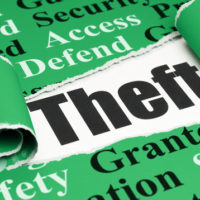Decoding Theft Crimes in Las Vegas: What Makes One Crime Worse than Another?

If you are charged with a crime involving theft in Las Vegas, it’s extremely important to make sure that the charges are clear, accurate, and supported by the evidence. Sometimes representing accused people is not just about trying to help people avoid convictions, but for experienced Las Vegas theft crimes defense attorneys, the job also involves making sure the government is bringing the correct charges.
When it comes to theft and related crimes, the differences between the facts needed to prove one crime and versus another can be very small, yet the penalties can be enormously different. At Lobo Law, we can carefully review the government’s evidence against you and help to determine whether you are being charged with the wrong crime or if evidence simply does not support the charges. If not, then there is sometimes a chance of outright dismissal, without even getting to the point of a trial. Talk to an attorney right away to review your options.
What is Theft?
Theft, in its most basic form, is simply the intentional act of depriving someone else of some property with the intent to permanently keep it from them. It can also mean “controlling” the property of another without permission. These terms, “control,” “deprive,” “intent,” and “property,” all have special meanings in the law, which sometimes do not always match up with common sense definitions. Theft crimes can be found starting at NRS 205.0821 in our state’s criminal code.
Theft Has Levels
There are varying degrees of theft crimes, so it is very important to review the facts closely.
- Petit Larceny – Also called Petty Theft, this is a misdemeanor crime in Nevada. If convicted, you could face jail time of up to 6 months with fines up to $1,000. Plus, you could be forced to serve community service.
- Felony Theft (Category C) – Once you take more than $650 worth of property, your crime becomes a felony. Any stolen car will, at a minimum, be charged as grand larceny (Category C). You could face up to 5 years in a state prison with fines up to $10,000.
- Felony Theft (Category B) – Once a stolen item (or the combined value of all stolen property) reaches $3500 or more, the crime is elevated to a Category B Felony, which is just about as bad as a criminal offense can be without having a violence component. Organized crimes and higher-value vehicle theft can both result in a Category B Stealing a firearm or explosives or items used to make a bomb can all be considered Category B Felonies. If convicted, you will face up to 10 years in prison with up to $10,000 in fines.
Restitution for Crimes
No matter what you steal, generally paying the victim back is a big part of the penalty. Where experienced theft defense attorneys often have success representing clients is helping the court and the government’s lawyers recognize that the charges do not fit the crime.
For instance, a person who inadvertently keeps a borrowed item may get charged with a higher category of crime than is appropriate in light of the item’s reduced or diminished value. Likewise, there may be other evidence, such as verbal agreements or borrowing arrangements, that would eliminate the element of “intentional deprivation.” To get help with your defense, call Lobo Law today to speak with an attorney about your charges.
Resource:
leg.state.nv.us/NRS/NRS-205.html#NRS205Sec0821
